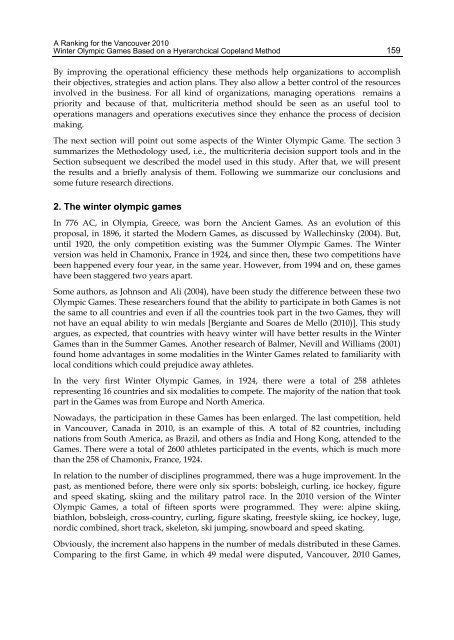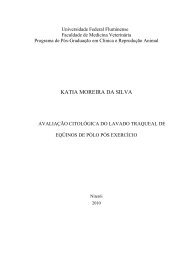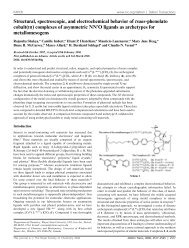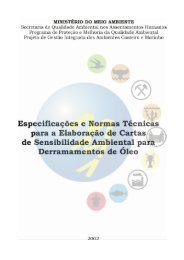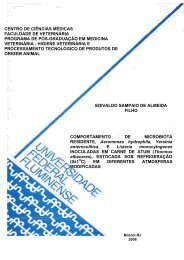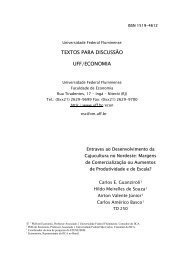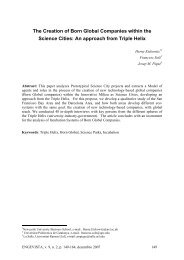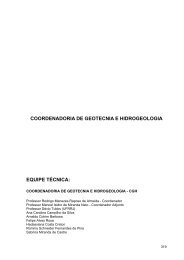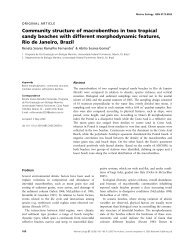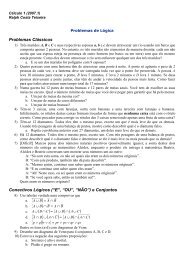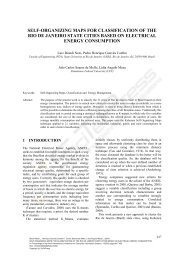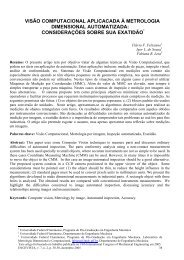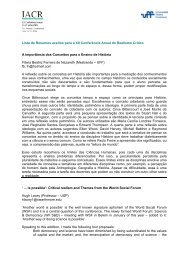A Ranking for the Vancouver 2010 Winter Olympic Games ... - UFF
A Ranking for the Vancouver 2010 Winter Olympic Games ... - UFF
A Ranking for the Vancouver 2010 Winter Olympic Games ... - UFF
Create successful ePaper yourself
Turn your PDF publications into a flip-book with our unique Google optimized e-Paper software.
A <strong>Ranking</strong> <strong>for</strong> <strong>the</strong> <strong>Vancouver</strong> <strong>2010</strong><br />
<strong>Winter</strong> <strong>Olympic</strong> <strong>Games</strong> Based on a Hyerarchcical Copeland Method 159<br />
By improving <strong>the</strong> operational efficiency <strong>the</strong>se methods help organizations to accomplish<br />
<strong>the</strong>ir objectives, strategies and action plans. They also allow a better control of <strong>the</strong> resources<br />
involved in <strong>the</strong> business. For all kind of organizations, managing operations remains a<br />
priority and because of that, multicriteria method should be seen as an useful tool to<br />
operations managers and operations executives since <strong>the</strong>y enhance <strong>the</strong> process of decision<br />
making.<br />
The next section will point out some aspects of <strong>the</strong> <strong>Winter</strong> <strong>Olympic</strong> Game. The section 3<br />
summarizes <strong>the</strong> Methodology used, i.e., <strong>the</strong> multicriteria decision support tools and in <strong>the</strong><br />
Section subsequent we described <strong>the</strong> model used in this study. After that, we will present<br />
<strong>the</strong> results and a briefly analysis of <strong>the</strong>m. Following we summarize our conclusions and<br />
some future research directions.<br />
2. The winter olympic games<br />
In 776 AC, in Olympia, Greece, was born <strong>the</strong> Ancient <strong>Games</strong>. As an evolution of this<br />
proposal, in 1896, it started <strong>the</strong> Modern <strong>Games</strong>, as discussed by Wallechinsky (2004). But,<br />
until 1920, <strong>the</strong> only competition existing was <strong>the</strong> Summer <strong>Olympic</strong> <strong>Games</strong>. The <strong>Winter</strong><br />
version was held in Chamonix, France in 1924, and since <strong>the</strong>n, <strong>the</strong>se two competitions have<br />
been happened every four year, in <strong>the</strong> same year. However, from 1994 and on, <strong>the</strong>se games<br />
have been staggered two years apart.<br />
Some authors, as Johnson and Ali (2004), have been study <strong>the</strong> difference between <strong>the</strong>se two<br />
<strong>Olympic</strong> <strong>Games</strong>. These researchers found that <strong>the</strong> ability to participate in both <strong>Games</strong> is not<br />
<strong>the</strong> same to all countries and even if all <strong>the</strong> countries took part in <strong>the</strong> two <strong>Games</strong>, <strong>the</strong>y will<br />
not have an equal ability to win medals [Bergiante and Soares de Mello (<strong>2010</strong>)]. This study<br />
argues, as expected, that countries with heavy winter will have better results in <strong>the</strong> <strong>Winter</strong><br />
<strong>Games</strong> than in <strong>the</strong> Summer <strong>Games</strong>. Ano<strong>the</strong>r research of Balmer, Nevill and Williams (2001)<br />
found home advantages in some modalities in <strong>the</strong> <strong>Winter</strong> <strong>Games</strong> related to familiarity with<br />
local conditions which could prejudice away athletes.<br />
In <strong>the</strong> very first <strong>Winter</strong> <strong>Olympic</strong> <strong>Games</strong>, in 1924, <strong>the</strong>re were a total of 258 athletes<br />
representing 16 countries and six modalities to compete. The majority of <strong>the</strong> nation that took<br />
part in <strong>the</strong> <strong>Games</strong> was from Europe and North America.<br />
Nowadays, <strong>the</strong> participation in <strong>the</strong>se <strong>Games</strong> has been enlarged. The last competition, held<br />
in <strong>Vancouver</strong>, Canada in <strong>2010</strong>, is an example of this. A total of 82 countries, including<br />
nations from South America, as Brazil, and o<strong>the</strong>rs as India and Hong Kong, attended to <strong>the</strong><br />
<strong>Games</strong>. There were a total of 2600 athletes participated in <strong>the</strong> events, which is much more<br />
than <strong>the</strong> 258 of Chamonix, France, 1924.<br />
In relation to <strong>the</strong> number of disciplines programmed, <strong>the</strong>re was a huge improvement. In <strong>the</strong><br />
past, as mentioned be<strong>for</strong>e, <strong>the</strong>re were only six sports: bobsleigh, curling, ice hockey, figure<br />
and speed skating, skiing and <strong>the</strong> military patrol race. In <strong>the</strong> <strong>2010</strong> version of <strong>the</strong> <strong>Winter</strong><br />
<strong>Olympic</strong> <strong>Games</strong>, a total of fifteen sports were programmed. They were: alpine skiing,<br />
biathlon, bobsleigh, cross-country, curling, figure skating, freestyle skiing, ice hockey, luge,<br />
nordic combined, short track, skeleton, ski jumping, snowboard and speed skating.<br />
Obviously, <strong>the</strong> increment also happens in <strong>the</strong> number of medals distributed in <strong>the</strong>se <strong>Games</strong>.<br />
Comparing to <strong>the</strong> first Game, in which 49 medal were disputed, <strong>Vancouver</strong>, <strong>2010</strong> <strong>Games</strong>,


